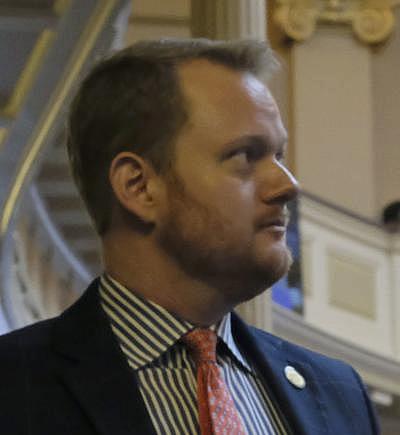Legislature funds ombudsman for foster children for first time
This story was produced as a project for the 2019 National Fellowship.
Other stories in this series include:
Virginia social services' plentiful rules, lack of central authority ensure plenty of heartbreak
VIDEO: What is the Social Services Under Strain series?
Pittsylvania board member who raised questions ends up suspended by state

Del. Chris Hurst
Richmond Times-Dispatch | File 2020
Virginia soon may hire a children’s ombudsman after the General Assembly passed a bill now headed to Gov. Ralph Northam’s desk. If signed, the law will go into effect July 1.
The Office of the Children’s Ombudsman will investigate complaints concerning the Virginia Department of Social Services and will have a heavy focus on foster care and child-placing decisions.
Del. Chris Hurst, D-Montgomery, introduced the bill for the third year in a row and the measure passed the House and Senate with a large majority.
As early as 2002, the General Assembly has passed this measure but has never funded it, Hurst said. Last year, Hurst’s bill proposed funding the office through the Child Advocacy Fund, which would charge an additional fine on people convicted of sex crimes against children.
But this year, the General Assembly included funding for the office in the state’s general fund budget.
“We felt like every single step of the way, there was a chance for this to die again because it has died so many times before,” Hurst said. “While we like the general idea, no one ever wanted to put the money behind it to fund the office.”
Hurst said he chose to sponsor the ombudsman bill his first year in office, and every year since, because of his experience interviewing foster parents while he worked as a reporter for WDBJ (Channel 7) in Roanoke.
He said he spoke to multiple foster families who had problems with their local social service offices, but feared retaliation if they complained. They told Hurst the ombudsman office would be a place they could report problems without fear.
In 2018, the Joint Legislative Audit and Review Commission recommended creating an ombudsman’s office to help fix problems in the state’s foster care system. The commission’s report detailed many problems with the state social services department’s accountability and oversight of local agencies across the state.
JLARC reports have documented the lack of accountability among local agencies for nearly 40 years. Reports have said agencies can operate for years with severe inadequacies and the local agencies have no recourse if they do not fix identified problems.
The 2018 report said that at least 14 other states have implemented an ombudsman office that has been able to improve child welfare programs.
“These mechanisms enable states to use strategic, targeted interventions when a local office is unable or unwilling to address identified problems,” the report said.
The ombudsman will be appointed by the governor for a term of four years, and the appointment must be confirmed by the General Assembly.
Any individual can submit a complaint to the ombudsman, but the ombudsman can also initiate an investigation without receiving a complaint.
After an investigation, the ombudsman can pursue any necessary action, including legal action, to protect the rights and welfare of a child who is receiving child protective services, in foster care, or placed for adoption.
The ombudsman can also advocate for legislative changes, make recommendations to social services offices and investigate violations of the rights of a foster parent.
Hurst said he hopes the new office will allow the people who serve the state’s most at-risk children to feel like their voices are finally being heard.
“I hope they feel confident and safe knowing they can make reports that won’t be used against them and would address and solve these problems in local departments,” he said. “I’m incredibly grateful that we got it done and still in somewhat disbelief.”

